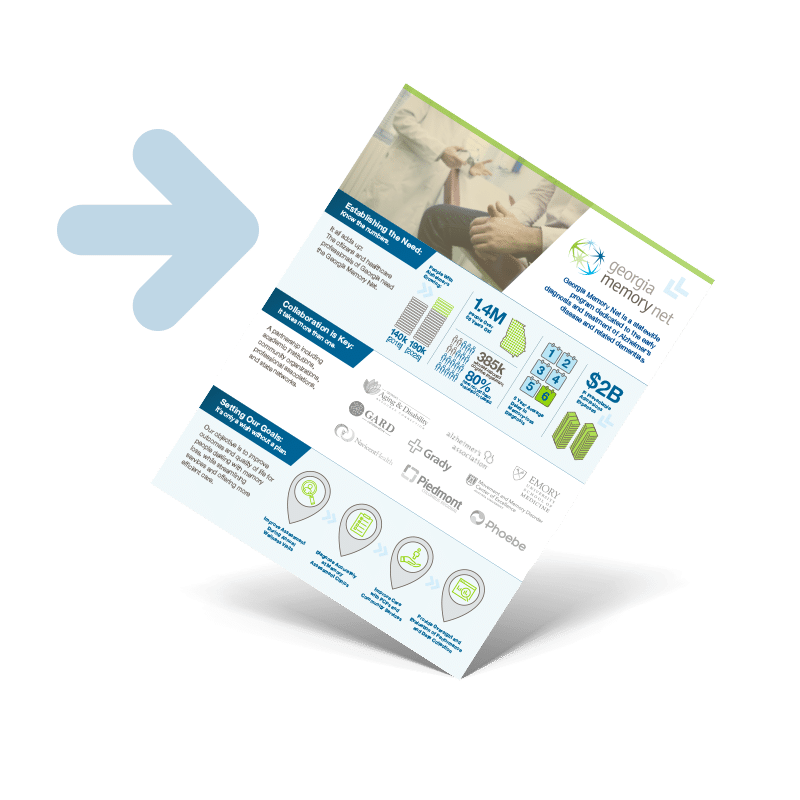Alzheimer’s and Dementia: Just the Facts
Knowledge is power and when you learn what Alzheimer’s statistics reveal about the nature of this devastating disease, it can be alarming, but it can also illuminate the path forward to ensure the best possible outcomes for patients and family members facing a diagnosis. What do you need to know about Alzheimer’s? Here are the facts:
Just how serious is Alzheimer’s?
According to our friends at the Alzheimer’s Association, this disease is the 6th leading cause of death in the United States, with 1 in 3 seniors dying due to this disease or another form of dementia While other leading killers such as heart disease dropped by 11% from 2000-2015, Alzheimer’s deaths increased by 123% during that same time period. It also kills more than breast and prostate cancer combined.
The Alzheimer’s facts show clearly that while approximately 5.7 million Americans are living with this disease in 2018, projections show that figure will climb to almost 14 million by 2050. The reality is that every 65 seconds, someone in this country will develop the disease.
Here are some other Alzheimer’s statistics to consider:
- Almost two-thirds of Americans with Alzheimer's are women.
- Older African-Americans are about twice as likely to have Alzheimer's or other dementias as older whites.
- Hispanics are about one and one-half times as likely to have Alzheimer's or other dementias as older whites.
Alzheimer's disease is the only top ten cause of death in the United States that cannot be prevented or cured. As an example of the serious nature of the condition, consider that for an average patient population at the age of 70, 61% of those with Alzheimer’s will not reach their 80th birthday. (Compared to just 30% of non-Alzheimer’s individuals.)
What is the impact on care givers and family?
There are 16.1 million care givers in the U.S. providing for people with Alzheimer’s or another form of dementia. Comprised of family and friends, they make up 83% of the help and support that comes to older adults in this country. And half of all caregivers that re providing care to the elderly are supporting an individual suffering from dementia or Alzheimer’s.
About two-thirds of care givers are women, with daughters of elderly patients comprising over one-third of dementia care givers. And these providers have burdens of their own, with many (25%) coming from what’s known as the “sandwich generation” that must support their children in addition to caring for a parent that has Alzheimer’s or dementia. About 34% of caregivers are also elderly themselves at age 65 or older.
While caring for a loved one suffering from an illness is always stressful, care givers for Alzheimer’s patients must deal with often irrational outbursts, assist with basic bodily necessities and watch someone they love slowly retreat into a world of their own. This is reflected in a sobering Alzheimer’s statistic that twice as many caregivers of those with dementia shared that they are struggling with substantial emotional, financial and physical difficulties.
If you’re a care giver supporting someone with Alzheimer’s or a related dementia, help is available, so remember: You’re not alone.
What’s the Cost?
But the cost is not borne by families alone. It’s estimated that in 2018, Alzheimer’s and other dementias will cost the U.S. $277 billion and by 2050, these costs could spiral to $1.1 trillion. This extreme burden on our national health infrastructure comes from the Alzheimer’s fact that dementia is one of the costliest conditions to society, and that people with Alzheimer's or other dementias have twice as many hospital stays per year as other elderly patients. Medicare beneficiaries with Alzheimer's or other dementias are shown to have a higher incidence of chronic conditions than patients without these issues. Patients with Alzheimer's or other dementias also make up a large proportion of all elderly patients that receive home health services and facility-based care.
What’s the benefit of early treatment?
But there is good news. While Alzheimer’s and many forms of dementia may not have a cure, one of the brightest Alzheimer’s facts is that there is a definite benefit to identifying the condition and treating it as early as possible. Alzheimer’s statistics show that of the population of Americans living today, if the percentage of Alzheimer’s patients were to be diagnosed during the early phase of the condition known as mild cognitive impairment (MCI), it would save $7-$7.9 trillion in health and long-term care costs.
Alzheimer’s disease can now be detected earlier than any time before, and early diagnoses can bring medical treatments, emotional and community support resources to bear while the patient still has a good quality of life. Early diagnoses can also enable an individual to make important decisions on legal financial and end of life issues while they are still cognitively able to make these decisions.
Early diagnoses alleviates some pressures off of the healthcare system as early treatment can result in long-term care planning instead of emergency care for an undiagnosed illness. This will drive down costs for the U.S. healthcare system as a whole in the long-run.
What happens if Alzheimer’s or another dementia is caught early? According to According to the World Health Organization (WHO), the principle goals for dementia care are:
- Optimizing physical health, cognition, activity and well-being
- Detecting and treating behavioral and psychological symptoms
- Providing information and long-term support to caregivers
Help is now available
But early detection and treatment of these diseases is not happening as often as you might think. In the state of Georgia alone, while there are 385,000 people with self-reported cognitive impairment, 80% have not yet been evaluated or treated for either Alzheimer’s or related dementia. The impact of this is clear: there is a 6-year average delay in memory loss diagnoses and 2 billion in preventable admission expenses within the state.
But we are taking action to address these Alzheimer’s[SL1] facts through the Georgia Memory Net. The Georgia Memory Net is a statewide program dedicated to the diagnosis and treatment of Alzheimer's disease and other dementias. Our mission is to provide patients, care givers and primary care providers, the tools they need for accurate diagnosis, appropriate treatment, and long-term support.
The goals of Georgia Memory Net:
- Improved screening and care of Georgians with memory loss and other cognitive impairments linked to Alzheimer’s and related dementias through a sustainable, primary care driven model.
- Support for regional Memory Assessment Clinics (MACs) to improve Georgians’ access to early and accurate diagnosis of Alzheimer’s disease and related disorders, and to improve long-term care and outcomes for patients and caregivers.
- Provide for ongoing training for MAC providers and staff, primary care providers, and community partners to ensure optimal care and linkages to support networks.
- Evaluate our progress and enhance linkage to care across MAC, PCP, and community partners over the long term. We will do this by using technology resources to ensure that all partners, including patients and their families, remain supported and informed.
Now that you have the facts, we hope that you are better prepared to deal with any impact that Alzheimer’s or related dementia might have on your own family. Just remember that information and support are your best defense against these diseases, and you can find both here.
Georgia Memory Net at a Glance
What is Georgia Memory Net and why does it exist? There’s so much information about Alzheimer’s and related dementias in Georgia, and how to diagnose and treat them, that it can become overwhelming. We’ve done our best to simplify the info into a clear one-page infographic.



